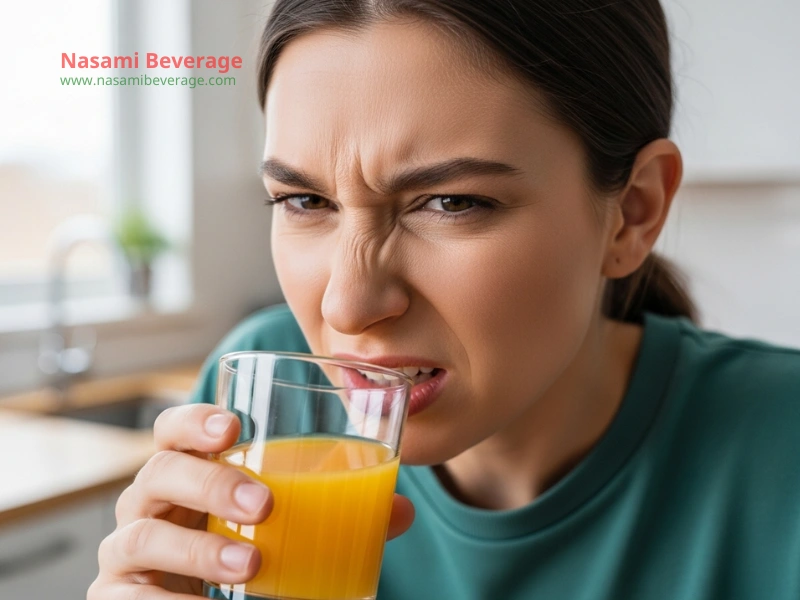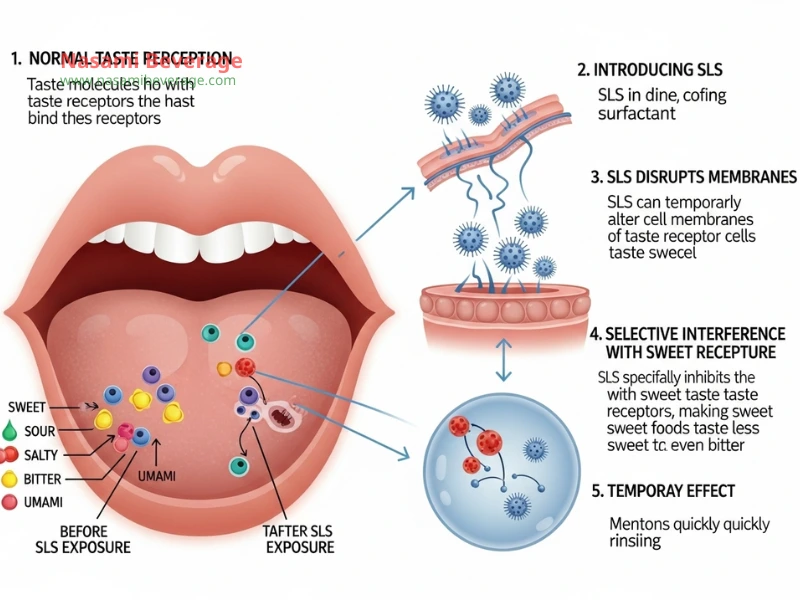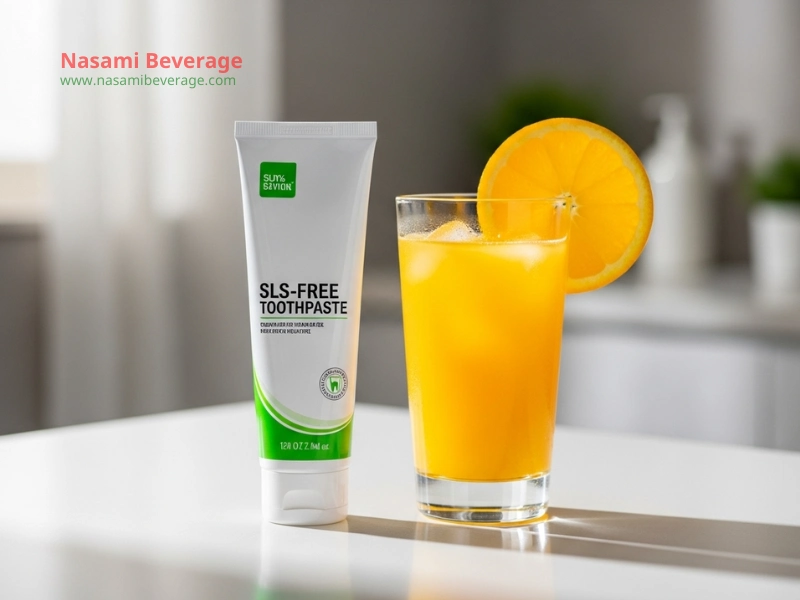Have you ever experienced that shockingly bitter, almost metallic taste when you drink a glass of orange juice right after brushing your teeth? It’s a common and unpleasant experience that many of us have faced, leaving us to wonder what in the world is happening inside our mouths.
This article, brought to you by the team at Nasami Beverage, will dive into the surprising science behind this phenomenon, reveal the true culprit, and provide simple yet effective solutions to help you enjoy your morning routine without that nasty aftertaste.
We’ll explore why your favorite citrus drink, a product known for its tangy sweetness, can suddenly become a dreaded liquid and what you can do about it. From the chemistry of your toothpaste to practical tips for your morning schedule, we’ve got you covered.
The Scientific Culprit – What’s Really Happening in Your Mouth?
The short answer to why orange juice tastes so terrible after you brush your teeth isn’t the juice itself; it’s your toothpaste. Specifically, it’s a common foaming agent found in most toothpastes called Sodium Lauryl Sulfate, or SLS.
This chemical is what creates the rich, bubbly lather that many of us associate with a “clean” feeling. While it’s highly effective at dislodging food particles and plaque, it’s also a mischievous compound that plays tricks on your taste buds.
The truth is, the acid in oranges isn’t the primary problem here. Your toothpaste is the real antagonist. It’s a two-part assault on your sense of taste, and once you understand it, the mystery of the bad orange juice aftertaste will finally be solved.

Sodium Lauryl Sulfate doesn’t just create foam; it’s a powerful detergent that alters the very environment of your mouth. It works in a couple of sneaky ways to completely change your perception of taste.
- It suppresses your sweet receptors: Your tongue has tiny sensors, called taste buds, that are responsible for detecting different flavors. When you brush with toothpaste containing SLS, the chemical actually temporarily blocks the receptors that are responsible for tasting sweetness. This means that when you take a sip of orange juice, the sugary taste you’re used to is completely muted or even completely gone.
- It breaks down the barriers that block bitter receptors: Your tongue has natural defenses against tasting things that are overwhelmingly bitter. There are compounds in your mouth called phospholipids that act as a barrier, preventing your bitter taste buds from going into overdrive. SLS, being a strong detergent, breaks down these protective phospholipids. Without this barrier, the natural, but usually masked, bitterness of the acid in oranges is now completely exposed and amplified.
So, when you take a sip, you’re experiencing a perfect storm: the sweetness is gone, and the bitterness is now intensified. This is why it’s not just the bad orange juice taste that is a problem; many other foods and drinks can also taste different immediately after brushing.
Practical Solutions to Enjoy Your OJ
Now that you know the science, you’re probably wondering what you can do about it. The good news is that there are several simple and effective ways to keep that unpleasant taste from ruining your morning. You don’t have to give up your favorite drink or compromise on your oral hygiene. Here are some easy solutions:
Change Your Brushing Order
This is perhaps the simplest solution of all. Instead of drinking your orange juice and then brushing your teeth, simply switch the order. Drink your juice first, then wait at least 30 minutes before you brush. Waiting for this amount of time is crucial.
The acid in oranges can temporarily soften your tooth enamel, and brushing immediately can wear it away over time. Waiting gives your saliva a chance to neutralize the acid and protect your teeth. This simple hack can make a huge difference in your morning routine.
Switch to an SLS-Free Toothpaste
This is a long-term solution that gets to the root of the problem. Many toothpaste brands have recognized that some people are sensitive to SLS and prefer not to have it in their products. Brands like Sensodyne, as well as many natural and organic toothpaste companies, offer SLS-free alternatives.

These toothpastes still contain fluoride and other essential ingredients to keep your teeth clean and healthy, but they use a different foaming agent that won’t mess with your taste buds. By making this switch, you can completely avoid the bad orange juice aftertaste without any extra effort.
Rinse Thoroughly
If you aren’t ready to switch toothpastes or change your morning routine, you can try this simple trick. After brushing with a brand like Colgate or Crest, rinse your mouth with water multiple times to wash away as much of the residual toothpaste and SLS as possible.
While this won’t completely eliminate the effect, it can significantly reduce it. You might also consider using a sugar-free mouthwash, which can help neutralize the mouth’s pH and wash away the lingering SLS.
The Bottom Line – Your Teeth and Your Taste Buds Can Coexist
The phenomenon of why does orange juice taste bad after brushing teeth is a perfect example of how a simple chemical can have a profound impact on our daily lives. By understanding the science behind Sodium Lauryl Sulfate and its effect on your taste buds, you can make informed choices about your morning routine.

Whether you choose to brush before breakfast, switch to an SLS-free toothpaste, or simply rinse more thoroughly, you now have the tools to ensure that your delicious glass of orange juice remains a morning delight, not a bitter surprise. You no longer have to suffer through that bad orange juice taste.
Frequently Asked Questions (FAQs)
Why do other things (like coffee or water) taste different after brushing?
Just like with orange juice, the SLS in your toothpaste can temporarily suppress your sweet taste receptors and enhance bitter ones. This can make water taste strangely flat or make coffee taste much more bitter than usual. The effect is temporary and typically fades within 30 minutes.
Is SLS-free toothpaste less effective at cleaning my teeth?
No, not at all. The SLS is primarily a foaming agent and has very little to do with the actual cleaning power of your toothpaste. SLS-free products still contain fluoride and other active ingredients that are essential for fighting cavities and maintaining good oral hygiene.
Does rinsing with mouthwash after brushing help?
Rinsing with a mouthwash can help wash away some of the residual SLS, but it might not completely eliminate the effect. However, if you are concerned about the acid in oranges and its effect on your teeth, using a fluoride-based mouthwash after drinking juice can help re-mineralize your enamel and provide an extra layer of protection.
Is drinking orange juice bad for my teeth in general?
While delicious, orange juice is quite acidic. Consuming large amounts can, over time, contribute to tooth enamel erosion. It is also important to consider questions like, “is orange juice bad for acid reflux?”. If you suffer from acid reflux, the high acidity can be a trigger. To protect your teeth, consider drinking it in moderation and with meals, and remember to wait at least 30 minutes after drinking before you brush.
This article was compiled and optimized for the search query why does orange juice taste bad after brushing teeth by the Nasami Beverage team, who are committed to providing you with the best knowledge for a great morning routine.
